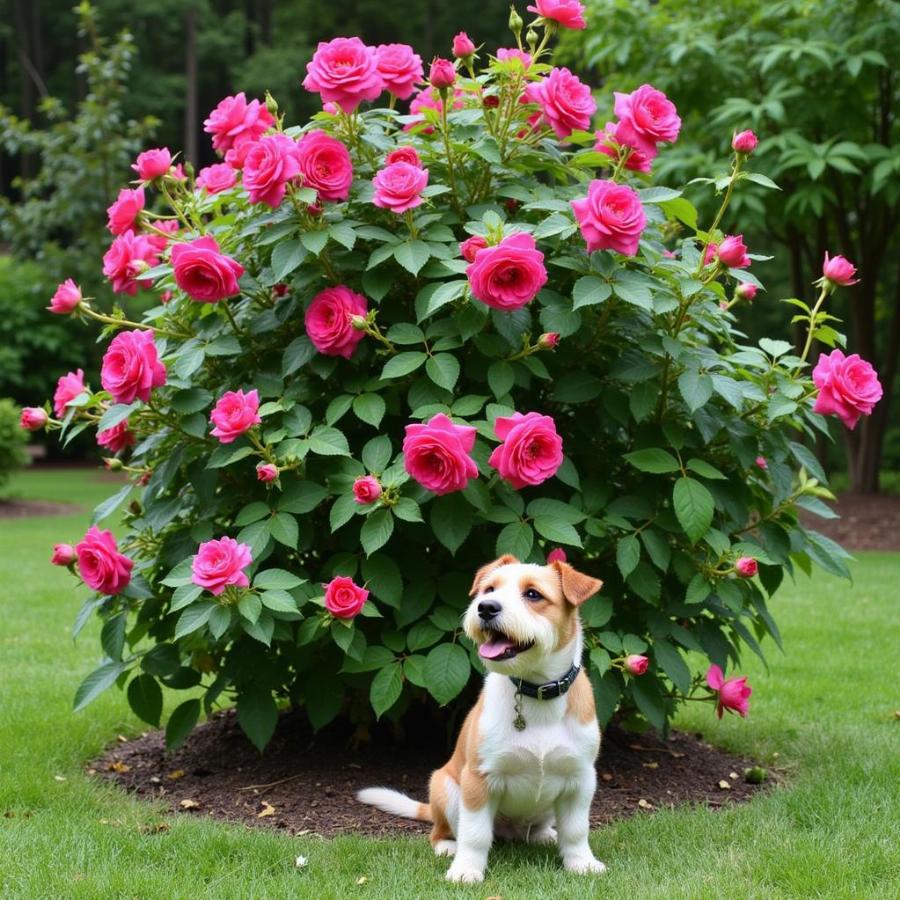Honeysuckle’s sweet fragrance and vibrant blossoms are alluring, but is honeysuckle poisonous to dogs? The answer is, unfortunately, yes. While not all honeysuckle species are equally toxic, many varieties contain glycosides in the berries and vines, which can cause gastrointestinal upset in dogs if ingested. Knowing the potential dangers of honeysuckle is crucial for responsible dog owners.
Understanding Honeysuckle Toxicity in Dogs
If your dog nibbles on honeysuckle berries or vines, they might experience symptoms such as vomiting, diarrhea, and loss of appetite. These glycosides can also cause an irregular heartbeat, though this is less common. The severity of the symptoms depends on the amount ingested and the specific honeysuckle species. Some cultivated varieties are considered less toxic than wild honeysuckle. However, it’s always best to err on the side of caution and keep your dog away from all types of honeysuckle. Early intervention is key to minimizing any potential harm.
What to Do if Your Dog Eats Honeysuckle
If you suspect your dog has ingested honeysuckle, contact your veterinarian immediately. Even if your dog isn’t showing any symptoms, it’s essential to seek professional advice. Describe the type of honeysuckle (if known), the estimated amount ingested, and any observed symptoms. Your veterinarian may induce vomiting or administer activated charcoal to absorb the toxins. Prompt action can significantly improve your dog’s outcome.
Preventing Honeysuckle Exposure in Dogs
The best way to protect your dog from honeysuckle poisoning is to prevent exposure. If you have honeysuckle in your garden, consider removing it or fencing it off to restrict access. When walking your dog, keep them on a leash and be vigilant about what they’re sniffing or attempting to eat. Training your dog to “leave it” can also be a valuable tool in preventing them from ingesting potentially harmful plants.
Safe Alternatives for Your Garden
If you love the look of flowering vines, there are many dog-friendly alternatives to honeysuckle. Consider planting crossvine, trumpet vine, or climbing roses. These beautiful options will add color and fragrance to your garden without posing a threat to your furry friend. Remember, a safe garden is a happy garden for both you and your pet.
 Dog-friendly climbing roses in a garden
Dog-friendly climbing roses in a garden
Can Dogs Eat Honeysuckle Nectar?
While the berries and vines of honeysuckle pose the greatest risk, the nectar itself can also cause mild stomach upset in some dogs. It’s best to discourage your dog from licking or drinking honeysuckle nectar.
What are the signs of honeysuckle poisoning in dogs?
The most common signs are vomiting, diarrhea, drooling, and lethargy. More severe symptoms, though less frequent, can include an irregular heartbeat and difficulty breathing.
How much honeysuckle is toxic to a dog?
The toxicity level varies depending on the species and the amount ingested. Even small amounts can cause digestive upset in sensitive dogs.
Are all parts of the honeysuckle plant toxic?
The berries and vines contain the highest concentration of toxins, but all parts of the plant can be potentially harmful.
What should I do if my dog eats honeysuckle?
Contact your veterinarian immediately. They will advise you on the best course of action.
Are there any home remedies for honeysuckle poisoning in dogs?
No, do not attempt to treat honeysuckle poisoning at home. Always seek professional veterinary care.
How can I prevent my dog from eating honeysuckle?
Remove honeysuckle from your garden, fence off areas where it grows, and keep your dog on a leash during walks.
Are there any dog-friendly flowering vines?
Yes, consider planting crossvine, trumpet vine, or climbing roses as safe alternatives.
Other Questions Related to Dog Safety and Plants
Are you interested in learning more about keeping your dog safe from toxic plants? You might also want to know about other common garden dangers. Check out these related articles: are clematis poisonous to dogs and mandevilla toxic to dogs.
In conclusion, while honeysuckle may be beautiful, it’s essential to keep it away from your canine companion. Being aware of the potential dangers and taking preventative measures will ensure your dog’s safety and well-being. Remember to contact your veterinarian immediately if you suspect honeysuckle poisoning.
Beaut Dogs is your go-to resource for all things related to dog care, offering reliable and expert advice on various dog breeds, their characteristics, and specific needs. From health and nutrition to training and grooming, Beaut Dogs covers a wide range of topics to ensure you can provide the best possible care for your beloved companion. Visit us at https://beautdogs.com. When you need assistance, contact Email: [email protected] to receive detailed and accurate answers from Beaut Dogs.